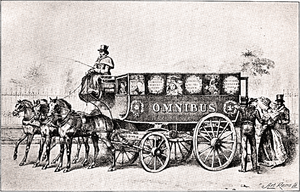User:Sir48/Sandbox2
Appearance

OMNIBUSES & CABS
THEIR ORIGIN & HISTORY
H.C.MOORE

PART I — OMNIBUSES
- Carrosses à cinq sous invented—Inauguration ceremony—M. Laffitte's omnibuses—The origin of the word "omnibus" as applied to coaches
- George Shillibeer introduces omnibuses into England—The first omnibus route—Shillibeer's conductors defraud him—His plans for preventing fraud—An omnibus library— Shopkeepers complain of omnibus obstruction.
- Shillibeer runs omnibuses in opposition to a railway—Extraordinary action of the Stamp and Taxes Office—Shillibeer is ruined—He appeals to the Government for compensation—Government promises not fulfilled—Shillibeer becomes an undertaker
- Introduction of steam omnibuses—The "Autopsy," the "Era" and the "Automaton"—Steam omnibuses a failure
- Some old omnibus names—Story of the "Royal Blues"—Omnibus racing—Complaints against conductors—Passengers' behaviour—The well-conducted conductor—The ill-conducted conductor—The "equirotal omnibus"
- Twopenny fares introduced—The first omnibus with advertisements—Penny fares tried—Omnibus improvements—Longitudinal seats objected to by the police—Omnibus associations—Newspapers on the "Favorites"—Foreigners in omnibuses—Fat and thin passengers—Thomas Tilling starts the "Times" omnibuses—Mr. Tilling at the Derby—Tilling's gallery of photographs
- Compagnie Générale des Omnibus de Londres formed—The London General Omnibus Company starts work—Businesses purchased by the Company—It offers a prize of £100 for the best design of an omnibus—The knife-board omnibus introduced—Correspondence system tried—Packets of tickets sold—Yellow wheels—The L.G.O.C. becomes an English Limited Liability Company—The first board of directors—Present position of the Company—The Omnibus: a satire—The Omnibus: a play
- The opening of Holborn Viaduct—An omnibus is the first vehicle to cross it—"Viaduct Tommy"—Skid-men
- A new Company—The London and District Omnibus Company, Limited—The London Road Car Company, Limited—Its first omnibuses—The garden seats—The flag and its meaning—Foreigners' idea of it—The ticket system—The great strike—The London Co-operative Omnibus Company—Mr. Jenkins and advertisements—The Street Traffic Bill—Outside lamps
- The Motor Traction Company's omnibus—An electric omnibus—The Central London Railway—The London County Council omnibuses—The "corridor 'bus"—The latest omnibus struggle—Present omnibus routes
- "Jumpers"—"Spots"—Some curious passengers—Conductors and coachmen—The Rothschild Christmas-boxes—Mr. Morris Abrahams and the Omnibus Men's Superannuation Fund—Horses—Cost of omnibuses—Night in an omnibus yard.
- Pirate omnibuses—Their history and tricks

PART II — CABS
- The introduction of hackney-coaches—"The world run on wheels"—The first hackney-coach stand and the oldest cab rank in England—Charles I. and Charles II. prohibit hackney-coaches—Hackney-coaches and the Plague—William Congreve—Threatened strike of hackney-coaches—Hackney-chariots introduced—Prince of Wales drives a hackney-coach—Licences—Funeral coaches ply for hire in the streets—A pedometer for hackney-coaches suggested—Dickens on hackney-coaches—Origin of the word "hackney"
- Cabs introduced into England—Restrictions placed upon them—A comical-looking cab—Dickens on cabs—Hackney-coachmen wish to become cabmen—The cab business a monopoly—Restrictions are removed—The Cab paper—The Boulnois cab invented—The "minibus"—The "duobus"—Bilking—A peer's joke
- Hansom invents a cab—Chapman designs and patents the present hansom—Francis Moore's vehicles—The Hansom patent infringed—Litigation a failure—Pirate cabs called "shofuls"—The "Clarence" or four-wheeler introduced—An unpleasant fare—The decoration of cabs—Cabmen compelled to wear badges—The "Tribus"—The "Curricle Tribus"—The "Quatrobus"
- A strike—Cabmen's revenge on Members of Parliament—Cab radius altered—Cabmen object to knocking at doors—The King of Cabmen—Nicknames—A lady feared by cabmen—The kilometric reckoner—Lord John Russell and "Palace Yard Jack"—Cab fares altered—A strike against the introduction of lamps—Another strike—The Cab-drivers' Benevolent Association—The London Cabmen's Mission—The Hackney Carriage Proprietors' Provident Institution—The Cabmen's Shelter Fund
- Cab show at Alexandra Palace—Forder's cab—The strike of 1894—Cabmen become organ-grinders— The Asquith award—Boycotting the railway stations—The "Bilking Act"
- Gentlemen cabmen—An applicant's nerve—The doctor-cabby—John Cockram—A drunken cabman's horse
- The Shrewsbury and Talbot cabs—The Court hansom—The Parlour four-seat hansom—Electric cabs introduced—The "taxameter"—Empty cabs—Number of Cabs in London—Cab fares—Two-horse cabs
![]()
This work is in the public domain in the United States because it was published before January 1, 1929.
The longest-living author of this work died in 1933, so this work is in the public domain in countries and areas where the copyright term is the author's life plus 90 years or less. This work may be in the public domain in countries and areas with longer native copyright terms that apply the rule of the shorter term to foreign works.
![]()
Public domainPublic domainfalsefalse
